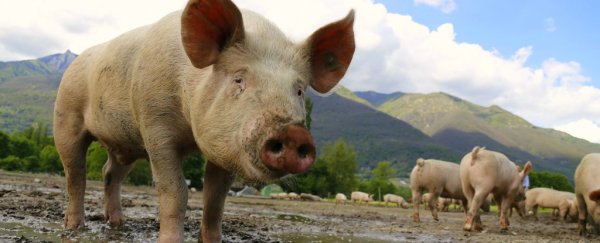Smithfield Foods, the world's largest pork producer, doesn't just raise pigs to be eaten.
The company announced April 12 that it plans to explore the possibility of using its hogs for medical purposes, including growing tissue and organs that can be transplanted into humans.
There hasn't yet been a successful transplant of a pig organ into a human, but recent scientific breakthroughs and advanced technology such as gene-editing tools are making the possibility more likely.
To use pig parts - like hearts or lungs - for human transplants, scientists have to edit certain genes to make the organs viable.
Courtney Stanton, VP of Smithfield Bioscience, tells Business Insider that the company hopes to use certain pig parts that usually go to waste, like hearts, to develop organs for humans.
"First and foremost, we are a food company," she says.
"Part of that responsibility is making sure we utilise the entire animal, and minimise waste. There are many parts of the animal which are not typically eaten. However, we have found valuable uses for these parts such as supplying them to the medical community."
In April, Smithfield joined a public-private tissue-engineering consortium, which is funded by an US$80 million grant from the US Department of Defence. Smithfield has also launched a separate unit, Smithfield Bioscience, to oversee its medical ventures.
Smithfield slaughters approximately 16 million pigs every year, and hopes to start selling pig parts directly to researchers and healthcare companies that conduct research on pig-human transplants.
Stanton says the company plans to look into ways all types of major organs and skin could be used for transplants.
"There are striking similarities between pigs and humans: for example, our DNA and digestive tract," she says.
More than 118,000 Americans are on the waiting list for organ transplants, and approximately 22 people die each day waiting on new organs, according to the US Health Resources and Services Administration.
In 2016, doctors performed a record-high 33,500 transplants.
The largest hurdle for pig-human organ transplants is the fact that pigs have genes encoded with viruses that could transmit diseases to humans.
A second challenge is immunology - if doctors were to introduce a pig organ to the human body, the immune system might reject the organ and attack it.
Smithfield, a US$14 billion subsidiary of the Chinese meat processing giant WH Group, already gathers and sells pig parts, like pancreases and thyroid glands, for a variety of medical purposes.
The US market for pork materials - for medical, pet food, and non-food purposes - totals over US$100 billion.
Most of the pork materials Smithfield sells are used to make ingredients in drugs that treat conditions like indigestion and hypothyroidism.
For example, the company supplies mucosa (a hog's intestinal membrane) to healthcare companies to create Heparin, a blood thinner that prevents clotting in surgeries. The parts have not yet been used to develop human cells, however.
While Smithfield is one of the largest companies venturing into pig-human transplants, it's not alone. Biotech startup Egenesis, which raised US$38 million in March, uses a gene-editing tool to make pig organs viable for transplants.
The regenerative medicine company Revivicor is also breeding pigs that have some genetic similarities to humans on a Virginia farm. The team has added five human genes to the pigs' livers, kidneys, and hearts.
Stanton says her team anticipates a learning curve as Smithfield attempts to harness these new technologies.
"Although we are still in the infancy stage of this new research, we hope to provide elements that will help to facilitate a variety of organ transplants and injury recovery solutions in the future," she says.
This article was originally published by Business Insider.
More from Business Insider:
